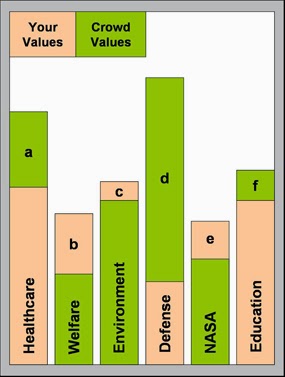The Joseon Dynasty wrote:Xerographica wrote:Economic models, on the other hand, I have no idea what the attraction is. What do they do or say that's so hot?
I assume you're referring to me here. I'm not using the model to predict anything. What I'm doing is putting your argument in a bare bones, reduced-form system and testing for logical consistency. Basically, if we strip everything away to the baseline of your argument (no information asymmetries, well-defined preferences, only non-stochastic outcomes, etc.) and try to look for your logic, will we find it? That's what that kind of economic model is used for, and here the answer was no. It's just logic. That's what economics is half the time, and you're not providing that.
My logic is sound...
1. Voting does not accurately communicate people's preferences
2. Congresspeople are not omniscient
Therefore, the supply of public goods will not accurately reflect the demand for public goods. Your logic has not come even remotely close to refuting this.




